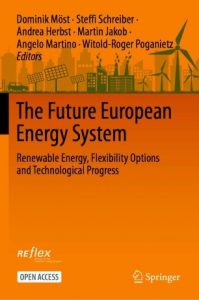The Future European Energy System
The future energy system in Europe needs to be decarbonized and thus be based almost exclusively on renewable energy sources. Therefore it is challenged by the intermittent nature of renewables and requires several flexibility options. The interaction between different options and the impact on environment and society are in the focus of this contribution. It has been the core objective of the Reflex research project funded by the H2020 EU research programme and is reflected in the book “The Future European Energy System – Renewable Energy, Flexibility Options and Technological Progress” appjust published by SpringerNature.
The book analyzes the transition toward a low-carbon energy system in Europe under the aspects of flexibility and technological progress. By covering the main energy sectors – including the industry, residential, tertiary and transport sector as well as the heating and electricity sector – the analysis assesses flexibility requirements in a cross-sectoral energy system with high shares of renewable energies. The authors apply models and tools from various research fields, including techno-economic learning, fundamental energy system modeling, and environmental and social life cycle as well as health impact assessment, to develop an innovative and comprehensive energy models system (EMS). Moreover, the contributions examine renewable penetrations and their contributions to climate change mitigation, and the impacts of available technologies on the energy system. Given its scope, the book appeals to researchers studying energy systems and markets, professionals and policymakers of the energy industry and readers interested in the transformation to a low-carbon energy system in Europe.
You can download the book as open access here.
Here is the link to the Reflex project website.
Link to the project page.

